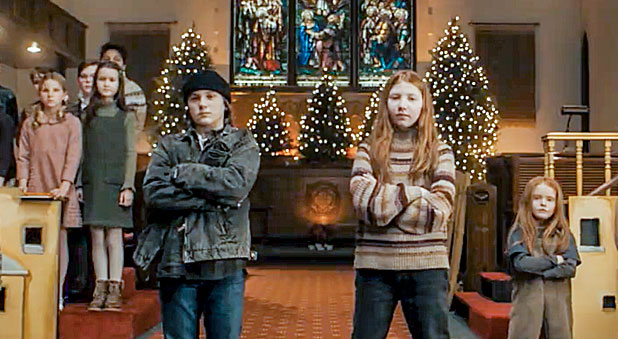Given our society’s propensity to create vastly inappropriate films for release at Christmas, The Best Christmas Pageant Ever is a rare beast. It not only focuses on what we should be celebrating at this time of year, but does so in a manner that is accessible, often hilarious and also thought provoking.
Directed by Dallas Jenkins, who created popular Netflix series The Chosen about Jesus’ ministry, the film is based on a 1970s children’s book of the same name (released in Australia as The Worst Kids in the World), which is set in a small town that has one claim to fame: an annual Christmas pageant.
The town also has a claim to infamy: the Herdmans – a family of six kids whose behaviour frightens, or at least intimidates, everyone in town. From stealing to fighting to smoking cigars, these kids do the lot, and no one knows how to deal with them.
The power of an invitation
Our story is told through the eyes of Beth (Molly Belle Wright), who, early on in the film, desperately asks God in her nightly prayers to send the Herdmans to a desert island. Her brother Charlie, in a kind of Sunday school “show and tell” at church, tells the congregation that the best thing about church is that the Herdmans aren’t there. Ouch.
Then the unthinkable happens: they rock up to Sunday school, because Charlie had boasted to one of the Herdman kids about all the food at church. He, of course, was blissfully unaware of how inviting this was to children who have very little, whose dad has scarpered and whose mum works so many jobs to make ends meet that no one in town knows her.
Here is where the film comes into its own. We’ve had the “awful kid” tropes to set the scene, and now things get interesting. Because the Herdmans decide they want to play the central roles in the Christmas pageant – the eldest, Imogene, is surprisingly determined to be “baby Jesus’ mum” – and at the first rehearsal it’s clear none of them have heard the biblical story of Christmas before.
The power of asking questions
They begin to ask questions. Lots of questions. This is eye-opening for the other children, not to mention us as viewers, as we may have heard the story of Jesus’ birth more times than we can count and never give the details in it a second thought.
What must it like for someone who doesn’t know the Christmas story? Who doesn’t understand what a manger is, why the innkeeper wouldn’t make room for a pregnant woman, or why the wise men brought such unusual gifts? And what’s with angels turning up to talk to people, or King Herod wanting to kill Jesus? Not to mention pictures that show Mary and Jesus looking so white and clean, as though they lived in a palace and she went through no hardships or difficulty to bring him into the world.
The Herdmans are hungry to know more, and while many townspeople are dead against the idea of them being in the pageant, Beth’s mother Grace (Judy Greer), who is running the event, is equally determined to let them stay. Because she’s remembered something the others seem to have forgotten: Jesus came for the Herdmans, too.
Who are your "Herdmans"?
And there’s the challenge. You can’t watch this without considering what “Herdmans” you might have in your lives. People who are different, or difficult, and who don’t understand what it means to know and love Jesus. Will we show the favouritism and unloving attitudes displayed in James 2 – treat such people poorly or turn them away? Or will we show our faith by what we do?
The original book isn’t explicitly Christian, but it hasn’t taken much to make it so. The story then, as now, is officially for kids, but also has plenty of food for thought for adults who want to live in a Christ-honouring way. We want to be patient and forgiving with open hearts, yet often we can be unkind, unthinking or judgmental when we focus on ourselves or choose what’s easy over what’s best.
We want to be patient and forgiving with open hearts, yet often we can be unkind, unthinking or judgmental...
It’s not hard to see where the film is going, and some of the characterisations, especially of disapproving adults, are pretty one-dimensional. Importantly, however, the Herdman children are not. As the story unfolds, we gradually see glimpses that help explain why they are the way they are.
There are also some very good performances, particularly from Molly Belle Wright as Beth and Beatrice Schneider as Imogene. You’ll be hard pressed not to tear up in places – and give thanks for the true wonder of Christmas.

































